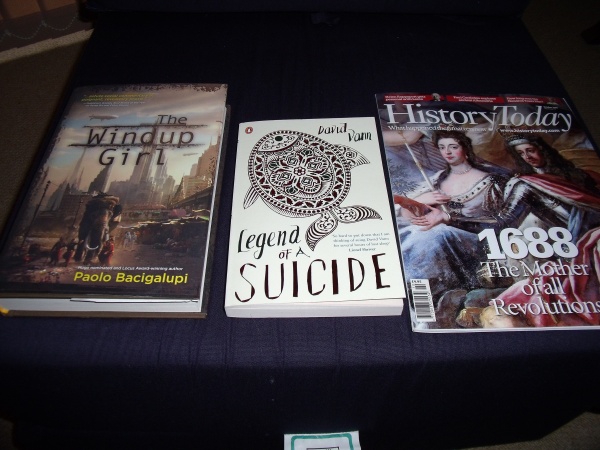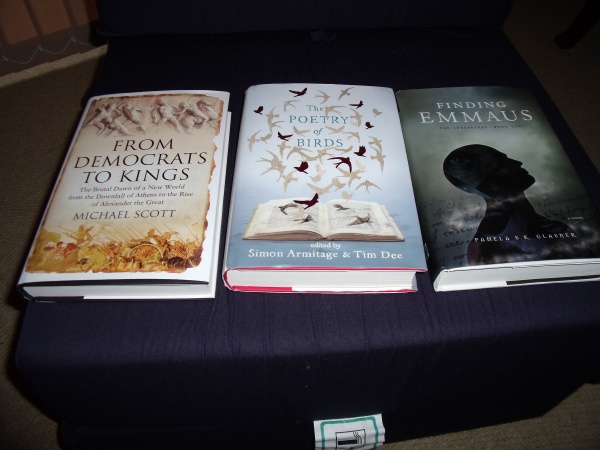For the past week-and-a-bit, I’ve been at the Cheltenham Literature Festival, my first time going to such an event. I wasn’t quite sure what to expect, and the rather tight separation between writers and audience (no real opportunities for interaction apart from Q&As at the end of each session, and signings afterwards) was a little disconcerting at first (I guess that’s the only practical way to run things with so many events and speakers). The Festival was quite celebrity-led (then again, isn’t contemporary publishing the same?); but, generally speaking, they were interesting celebrities, and there was plenty of other stuff going on. All in all, I had a good time, and went to a nicely varied programme of events.
I never had internet access while I was away, otherwise I’d have blogged about the Festival in more detail while I was there. Instead, I present the edited highlights, which are pretty long as it is…
Friday 9th
6.00 pm: My first event, listed in the festival brochure as ‘The Man Booker Winner’, who of course in the end was Hilary Mantel.
I haven’t traditionally had much luck with Booker titles (of all the nominees, and one winner, that I’ve read, I can only truly say that I liked Animal’s People by Indra Sinha), but I certainly became interested in reading Wolf Hall after hearing Mantel read from it, and speak so enthusiastically.
7.30 pm: Leaving the Town Hall, I realise that I’ve just passed a fellow Huddersfielder, the poet Simon Armitage. He is today’s Guest Director (there’s one for each day of the Festival, who has programmed three events for that particular day).
Saturday 10th
11.30 am: I have the morning free, so I’ve been to look around town. As I’m going into the Town Hall, I think back to seeing Simon Armitage last night, and wonder if I could play a little game of ‘Guest Director bingo’, just to see how many of them I could spot over the ten days. At the precise moment I think this (and I swear I’m not making this up), I reliase that today’s Guest Director, Richard Eyre, has just walked past me. That makes up my mind: the challenge is on!
1.30 pm: Off to the Centaur pavilion (what a great pun) at the racecourse to see Michael Palin. He talks about his career in the 1980s, the period covered by the new volume of his diaries. Much as I like Palin’s work (he’s one of the few writers I’ll be seeing who I’ve actually read), I’m more familiar with his travel programmes than this part of his career, so it’s interesting to hear his behind-the-scenes tales of (mostly) the films he made at that time.
4.00 pm: Marcus Chown, the New Scientist‘s cosmology consultant, talks about his latest book, which (says the brochure) ‘looks at what the everyday world tells us about the universe’. The discussion about science is interesting, but I don’t gain much sense of what the book is actually like.
6.30 pm: Readings and discussion from the novelists Diana Evans and Patrick Neate. The latter, I would say, is the better reader; but both books sound interesting, and so my ‘would like to read’ list grows a little longer.
8.45 pm: Quite interesting stuff from John Lloyd and John Mitchinson, the creators of QI. They can’t talk about their new book, because it’s not finished yet; nevertheless, their enthusiasm is infectious.
Sunday 11th
10.00 am: Am I cheating in my game of Guest Director bingo if the only time I see them is when I know I’m going to? Well, it’s my game, with my rules, so I decide that the answer is no. So, here is today’s Guest Director, Sandi Toksvig, interviewing the novelist Kate Mosse. Actually, it’s less of an interview than a chat between friends — and less informative (to me, as someone who has never read Mosse but thought about it) as a result.
12.00 pm: The first of several occasons when I miss out on an event to which I wanted to go. There were no tickets left for Harry Hill; disappointing, but never mind.
4.00 pm: Back to the vast (and full) auditorium of the Centaur, where Mark Lawson is interviewing Mitchell and Webb. I’ve never really watched them, but find them quite funny here; and the talk of how they work as a double act is interesting.
7.30: Time for something different — two hours of dynamic storytelling by the excellent Ben Haggarty. He weaves a wonderful tale that begins with his visting a freak show at a carnival in America, and ends on the moon, where he discovers the truth about his profession. I don’t know how often Haggarty tours, but if he comes anywhere near you, go and see him.
Monday 12th
10.00: A talk by David Elder about an anthology he has put together of writing about Cheltenham. This was one of the events I was less sure about, didn’t know quite what to expect, and ultimately I found it a bit dry. To be fair, I would probably have got more out of it if I were a Cheltonian.
Lunchtime: I’ve been wandering around, trying to find somwhere nice to have lunch, and end up going from one side of town to the other. It’s good for my game of Guest Director bingo, because at one point I pass a group of people which includes today’s Guest Director, Chimamanda Ngozi Adichie.
4.00 pm: A conversation between P.D. James and Ruth Rendell. As with the Toksvig/Mosse event yesterday, these two are good friends; and, though the talk is interesting enough, I once again feel that the writers’ fans will have got more out of it than I did.
8.45 pm: I did want to see Hugh Fearnley-Whittingstall now, but the event had sold out. Instead, I’m at the interview of another Channel 4 presenter, Kevin McCloud, who is talking about European architecture and the idea of the ‘Grand Tour’. He’s a marvellously entertaining speaker, even breaking into spontaneous impersonations of Brian Sewell and Prince Charles. I’m not particularly into architecture, but McCloud makes the subject interesting; and he’s not the only person who will do so this week — but that can wait for another instalment…
Like this:
Like Loading...
 This is where I start from: David Malouf’s name was unknown to me before I received the review copy of Ransom, but I gather now that he is one of Australia’s most acclaimed writers. The novel (Malouf’s first in ten years) draws on Homer’s Iliad, which I’ve never read; and the Trojan War is one of the aspects of Greek mythology that I don’t know much about. In short, I came to Ransom largely from a position of ignorance, which means I’ve probably missed a lot of the book’s subtleties – but let’s see what I can take from it all the same.
This is where I start from: David Malouf’s name was unknown to me before I received the review copy of Ransom, but I gather now that he is one of Australia’s most acclaimed writers. The novel (Malouf’s first in ten years) draws on Homer’s Iliad, which I’ve never read; and the Trojan War is one of the aspects of Greek mythology that I don’t know much about. In short, I came to Ransom largely from a position of ignorance, which means I’ve probably missed a lot of the book’s subtleties – but let’s see what I can take from it all the same.

Recent Comments